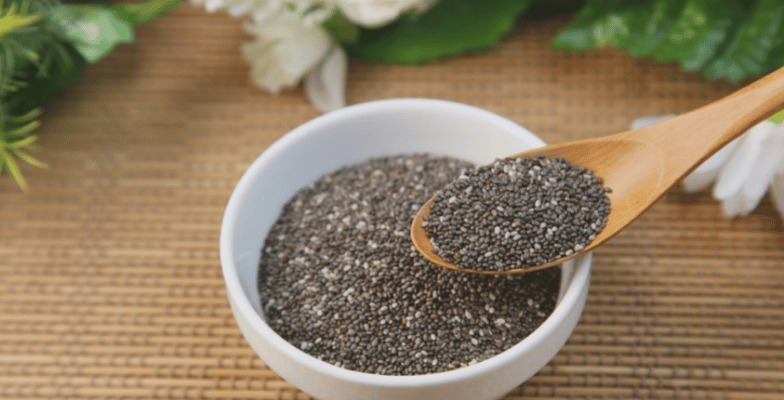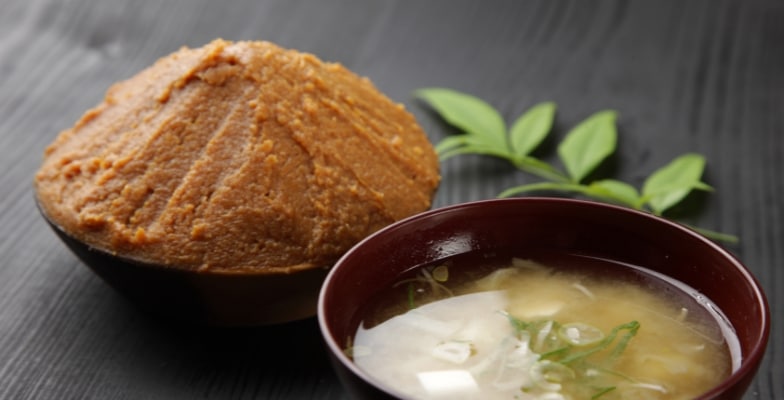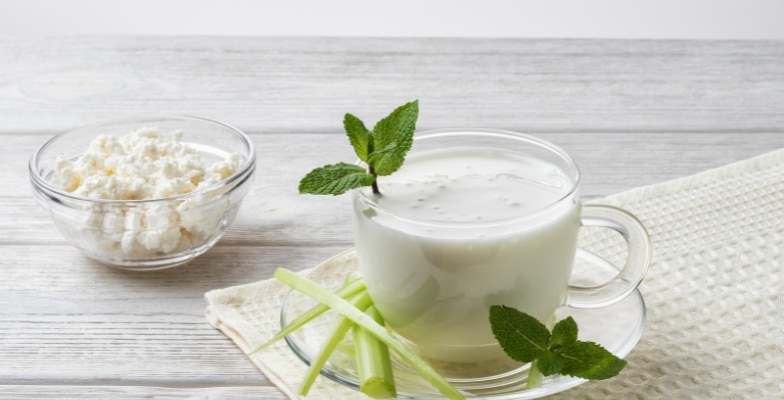What Are Chia Seeds? Nutrition Facts And Health Benefits
- What Are Chia Seeds?
- Chia Seeds Health Benefits
- How To Add Chia Seeds To Your Diet
- Does Eating Chia Seeds Pose Potential Health Risks?
- Conclusion And My Recommendation

Size doesn’t matter when it comes to chia seeds. Despite their small size, chia seeds are jam-packed with nutrients, antioxidants, and fiber. Let’s find out how these seeds may do wonders for you.
What Are Chia Seeds?
Chia seeds are small seeds from the Salvia hispanica plant, a member of the mint family. They are multicolored, including black, brown, and white. Chia seeds are native to Mexico, and some ancient civilizations, like the Mayans and Aztecs, consumed them. In fact, ‘chia’ is the Mayan word for ‘strength.’
Despite being a key food for certain civilizations in ancient times, only recently have chia seeds become famous as a modern-day superfood.
These seeds have gained massive popularity and become an essential food for many health-conscious people. One of the amusing things about chia seeds is their ability to soak up water. They can soak up as much as twelve times their weight.
Chia Seeds Health Benefits
Rich In Fiber
One ounce of chia seeds provides 9.75g of fiber, a pretty impressive number. The fiber in chia seeds is mainly soluble fiber and mucilage, a substance that gives moistened chia seeds a gluey texture. Our bodies cannot digest fiber; still, fiber gives us many health benefits.
Let’s look at some
-Fiber slows the breakdown of starch into sugar. This helps maintain steady blood sugar.
-Fiber aids in lowering LDL or bad cholesterol, as well as makes the feces smooth.
-Fiber may also help prevent the formation of small blood clots that can provoke heart attacks or strokes. 1https://www.hsph.harvard.edu/nutritionsource/what-should-you-eat/whole-grains/, 2https://pubmed.ncbi.nlm.nih.gov/9925120/
Related Article: What Is Fiber? Health Benefits, Food Sources And Daily Requirements
Antioxidant Properties
Free radicals are highly unstable elements that naturally appear when we exercise or when our bodies convert food into energy. Exposure to smoking, drinking alcohol, air pollution, and U.V. rays also form free radicals.
Free radicals can cause oxidative stress, triggering cell damage and leading to various complications, including cancer, cardiovascular disease, diabetes, and premature aging. Antioxidants help counteract oxidative stress. Chia seeds are loaded with antioxidants, which can help prevent these conditions. 3https://pubmed.ncbi.nlm.nih.gov/24811150/
Source Of High-Quality Protein
One ounce of chia seeds provides 4.69 g of protein, which is quite a decent amount. They also have a good balance of essential amino acids. 4https://pubmed.ncbi.nlm.nih.gov/23240604/, 5https://pubmed.ncbi.nlm.nih.gov/21339125/ Most of us are aware of how vital protein is for our bodies. It is the favorite nutrient for those aiming for muscle building and also a friendly nutrient for weight loss warriors.
Related Article: 7 Functions Of Protein In The Body
May Reduce Blood Sugar Levels
In animal studies, researchers found that chia seeds are high in alpha-linolenic acid, a fatty acid. This fatty acid may improve insulin sensitivity and blood sugar control, balancing after-meal blood sugar. 6https://pubmed.ncbi.nlm.nih.gov/24120122/, 7https://pubmed.ncbi.nlm.nih.gov/18492301/
A few human studies also show that eating bread that contains chia seeds may lower post-meal blood sugar spikes more than bread that does not contain chia. 8https://pubmed.ncbi.nlm.nih.gov/20087375/, 9https://pubmed.ncbi.nlm.nih.gov/23778782/
May Promote Bone Health
Chia seeds are very high in nutrients that are key to bone health, such as calcium, phosphorus, and magnesium. A single ounce of chia seeds provides 18% of the calcium we need daily, 27% of phosphorus, and 30% of magnesium.
These numbers are higher than most dairy products. Thus chia seeds may be a good option for those who do not eat dairy products. However, there is a substance in chia seeds called phytic acid, which can reduce calcium absorption to some extent.
How To Add Chia Seeds To Your Diet
There are multiple ways to eat chia seeds. We can use them raw in dishes like cereal, yogurt, and even vegetables. When soaked in water, the seeds develop a jelly-like texture, making it easy to mix them into cooked cereal or other dishes. They are also used to create healthy puddings.
Chia seeds don’t have much flavor on their own but can blend well with things like bread and butter, salads, soups, oatmeal, sauces, muffins, cakes and smoothies.
Does Eating Chia Seeds Pose Potential Health Risks?
Chia seeds are a good source of fiber. Although fiber is good for health, for some people, too much fiber may cause issues. Excessive fiber intake can cause abdominal pain, constipation, diarrhea, bloating, and acidity.
These conditions may occur when high fiber intake is not paired with a sufficient amount of water since water is essential to help the fiber pass through the digestive system.
Thus, always remember to drink plenty of water to avoid these issues. The absorptive capacity of chia seeds can be useful in cooking or baking, but sometimes chia seeds can be unsafe as they can quickly swell up and get stuck in the throat.
In 2014, a case report presented at the American College of Gastroenterology made headlines. It described a patient who ate dry chia seeds followed by a glass of water. The seeds expanded in the patient’s throat and caused a blockage. 10https://www.hsph.harvard.edu/nutritionsource/food-features/chia-seeds/#:~:text=A%20case%20report%20presented%20at,esophagus%20and%20caused%20a%20blockage.
To avoid this, it’s best to soak chia seeds before eating them. Still, those with swallowing problems need to be careful when eating chia seeds.
Conclusion And My Recommendation
Chia seeds have been used since ancient times for the health benefits they offer. Just a small serving of chia seeds provides a pile of nutrients, antioxidants, protein and fiber. One ounce of chia seeds significantly contributes to the daily recommended intake of calcium, magnesium, phosphorus, and manganese.
Chia seeds have many health benefits. They may help control blood sugar, are full of antioxidants, are high in fiber, aid in bone health, and have many more benefits. There are also a few potential risks in consuming chia seeds. But, with precautions, the risks can be easily overcome.
However, those who are allergic to chia seeds should avoid them. Also, those who face issues with a high fiber intake should drink plenty of water. And remember, while it’s important to drink plenty of water when you eat a lot of fiber, avoid eating dry chia seeds immediately followed by water to prevent throat blockage. Instead, soak the seeds before eating them.
In my view, chia seeds are too good to leave out of a healthy diet plan. They deserve to be part of your daily eating habits. I recommend a one-ounce serving of chia seeds daily as part of your balanced diet. I mix roasted chia seeds with rice, pulses, and vegetables.
What do you think about this article? Have any questions? Let me know in the comments below!

Skill-Based Education.
Global Recognition.
Powerful Community Building
Secure a certificate of completion in as little as a day by graduating from one of our free courses.
Get Access to Our Free Courses. No Credit Card Required.

Fabulous Body Membership
Your All-Access Pass to A Fabulous Body & A Rewarding Career
25+ Certificate Courses & Programs, All Included
15 Day Free Trial, 100% Money-Back Guarantee
About Rohit Kumar
Rohit Kumar is an avid writer who puts a lot of his emotions in words through his articles. Today, he is a certified fitness expert with a vast knowledge on nutrition and has contributed to the pages of Fabulous Body with his articles.










